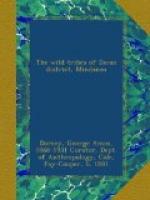Datu Ansig of Talun informed me that, unless the death of some great person made a special sacrifice necessary, there was only one such offering made during the year, and that at the time the decorated poles were placed in the dwelling.
The time for the festival having been agreed upon, messengers are sent to other datu and head-men, inviting them and their people to attend. Sufficient food is prepared for the guests and when all is ready the mabalian takes one chicken from among those to be used for food and frees it as an offering to the gimokod. It is bidden to wander about in the forest, and no one will molest the fowl, for should he do so he is certain to become ill.[1] The mabalian has previously placed festoons of leaves and vines at various points in the house and now she spreads a mat on the floor. A jar of balaba, wine, stands at each corner, while at one end is an agong, and a plate containing betel nut, leaf, and two varieties of rattan; at the other end are several tambara. When all is thus prepared the people place offerings of beautiful clothing, knives, and other costly gifts on the mat. Two mabalian, a man and a woman call upon the spirits,[2] urging them to look with favor on the offering made by the people, to grant them a good year with health and plentiful harvests, to let their journeys be without mishap, and to keep them all under their constant care. The tambara are fastened in various parts of the house, and the gifts are hung on or laid beside them. Later these offerings may be removed by their former owners who now regard them as being loaned to them by the spirits.
[1] This offering is not made at Bansalan, neither has the mabalian any part in the ceremonies of the first day.
[2] Those called at this time are Toglai, Toglibon, tigyma, and Kalayagan—Eugpamolak Manobo.
[Transcriber’s note: The word tigyma in the above footnote should be spelled tigyama.]
Following the offering the magani go to a bamboo thicket and cut two large poles, one nine sections long, the other eight. With each stroke of the knife the men give their battle cry, then when the poles are felled, all seize hold and carry them to the house of the datu. Here they are decorated, first by being cut down for short distances, thus leaving the lower part attached so that the shavings make a sort of fringe, and then by attaching strips of palm or bamboo leaves and cloth or palm leaf streamers. When complete these poles are known as patan’nan and are then the property of the spirits Mandanagan and Darago. The longer one is for the male spirit, while the one of eight sections is for his wife. Under no circumstances may anyone not a magani touch these poles. They are carried into the house and are fastened near to the elevated platform at the end of the room where the datu or leading




